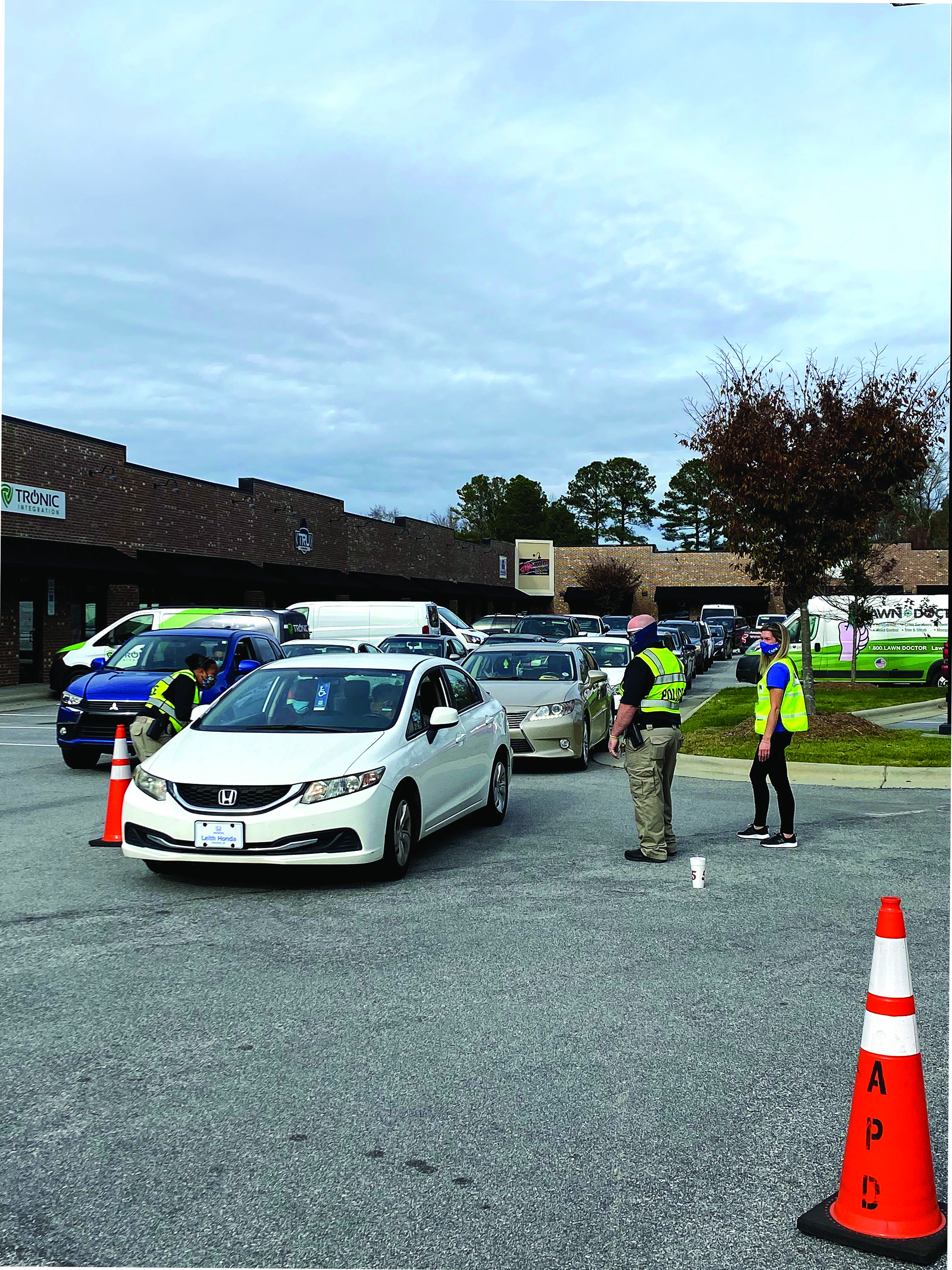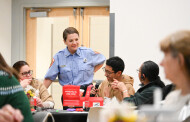Editor’s note: This is a follow-up to Suburban Living’s story about the Western Wake Crisis Ministry that appeared in the June/July 2020 issue and examines how the nonprofit has coped with the effects of the coronavirus pandemic over the past six months.
It’s been a year since the COVID-19 outbreak sent shockwaves throughout the U.S. The pandemic continues to alter our daily lives and has caused many people to experience deep financial hardship, loss of employment, food insecurity, and even homelessness. Americans are not alone; according to the World Health Organization, tens of millions of people worldwide are at risk of falling into extreme poverty – a stark statistic resulting from the pandemic’s unrelenting grip on humanity.
For many families across Western and Southwestern Wake County, the damaging effects of the pandemic have affected them in ways no one could have imagined. Apex-based Western Wake Crisis Ministry has witnessed these repercussions firsthand, and yet remains stalwart in its efforts to aid the region’s most vulnerable populations in Apex, Holly Springs, Hope Mills, Fuquay-Varina and Willow Springs.
WWCM Interim Executive Director Wendy Scott says, “The demand for our services and support has continually increased approximately four times the normal pre-pandemic volume in the latter half of 2020 as subsequent waves of COVID-19 continue to occur. As the pandemic continued to impact our operations in similar and different ways since the summer, we continued to pivot as needed to serve our clients. We have been able to continue curbside pickup and some limited open-air market days through advance signups, which provide people with the opportunity to choose what food they need.”
WWCM added more slots for food pickup each week (some days reaching more than 40 families), in addition to the clients requiring home delivery and those who qualify for the senior boxes. (The ministry is currently at its maximum available home deliveries, but individuals may contact 919-362-0657 and ask to be placed on the waiting list.)
WWCM distributed 107,000 pounds of food to 600+ households monthly in the last quarter of 2020. Large food distribution days continued into the fall, including two Thanksgiving events during which a total of nearly 400 families received grocery gift cards for turkey and other food. Its Christmas distribution on Dec. 19 served canned goods, eggs and meat to 170 families.
A Generous Community
WWCM has seen a substantial uptick in pantry donations since November, which created a “good problem,” Scott says. In addition to the usual increase in holiday food drives and food donations, the public’s awareness of the ongoing challenges of food insecurity recently resulted in the nonprofit receiving more food than it had the capacity to process and distribute.
“Fortunately, in addition to the three warehouses in which we already store and manage pantry donations, the Apex United Methodist Church – one of our partners – gave us access to a space suitable for holding donations as we worked quickly to manage the distribution. We temporarily put a hold on deliveries for a very short time until we could receive food again and properly prepare it for distributing.”
To accommodate the large quantity of food donations, WWCM recently installed extensive shelving in two of its warehouses, and a new scale and carts will be added in January.
Alleviating Financial Hardship
WWCM has benefitted from an increase in food aid, but it has also witnessed a swelling number of families seeking financial assistance. “We provided nearly triple the typical financial assistance for rent and utility needs in the fourth quarter of 2020,” she notes.
Scott explains the federal moratorium on residential evictions was subject to ending just prior to the holidays but received Congressional support for an extension through Jan. 31. “The threat of losing housing will likely be an ongoing issue for the residents of the communities we serve well into the new year. WWCM is committed to continuing our rent assistance program for those who are unable to pay rent due to the loss of jobs or other issues.”
The Recovery Fund and the HOME Project
In response to the economic fallout of the pandemic, the ministry launched the Family Recovery Fund to support families and individuals in WWCM’s service area who fall within 60% or less of the area median income or who are experiencing economic distress due to a crisis or hardship related to the pandemic. Scott says the funds will be used to increase housing, food and financial stability for families in the Western and Southwestern regions of Wake County by providing appropriate and limited financial assistance, case management, and coaching and resource support for families most at risk of food and housing insecurity.
As part of the HOME Project, “Participants are paired with a social worker and a volunteer advocate who will work together as a team with the participant to stabilize housing and home finances. Together, they create a stabilization plan to be implemented with direct financial assistance and coaching from WWCM and the coordination of services with other community agencies,” she says. Although HOME Project services are continuing, they are being offered telephonically for the health and safety of those involved.
Volunteerism in the New Normal
WWCM’s valuable network of volunteers helps with everything from distributing food, assisting in the warehouse, conducting virtual meetings with clients and helping with administrative duties.
Scott says, “Pre-pandemic, WWCM had approximately 140 active volunteers. On an average day, we would have approximately 20 volunteers in our building. In order to follow social distancing guidelines, we currently can only have five volunteers in our building at a time, so we are looking for volunteers who can commit to a once-per-week shift (3 hours) or more. This allows us to spend a little less time training and on-boarding volunteers while maintaining efficiency in our food distribution process.”
Transitioning from in-person to virtual interaction with clients from the initial intake process to support implementation has continued to evolve since the summer as WWCM refined and improved the delivery of its services. “Our dedicated volunteers have embraced this new way of providing support and communicating with our prospective and current clients by working remotely, even when it has required learning new technology and challenging logistics at times,” she says.
WWCM limits the number of volunteers in the food pantry and office areas and screens them upon arrival with temperature checks and CDC-recommended health questions. Personal protective equipment (PPE) is made available to everyone including individuals receiving food, if needed. The ministry follows strict CDC guidelines as the health and safety of its clients, staff, partners and other stakeholders continues to be a top priority on a daily basis.
Charting the Future
For Scott, who has been a resident of Wake County for nearly 37 years, this is the fourth interim role for which she has been able to immediately contribute her experience when an organization is going through an anticipated or sudden management transition. She was especially attracted to WWCM’s mission and focus on serving local communities. She has served diverse charitable nonprofits and associations based throughout the U.S. and internationally as an executive director/CEO, consultant and coach for four decades. WWCM’s former director, Beth Bordeaux, now serves as director of strategy and development for Raleigh Wake Partnership to End and Prevent Homelessness.
Food and charitable donations are vital to WWCM’s continued success. Scott says, “Historically, the WWCM pantry inventory drops significantly in January and February following the holiday surge. We especially need food donations in January, February and March as the new year begins.” The pantry asks that food donations consist of nonperishable items that have not expired and ideally won’t expire for many months or 1-2 years in the future, when possible. It also strives to provide a variety of food items and sometimes needs certain categories that have been depleted. For a list of these, visit wwcm.org/donate/items-needed.
Food drives coordinated by organizations and neighborhoods are also appreciated. If your organization or neighborhood is interested in hosting a food drive, contact Interim Pantry Manager Jeremiah Caswell at jeremiah@wwcm.org in advance to learn what specific items are most needed and to schedule the delivery of your donation.
WWCM is adapting well in the face of adversity. “We are more grateful than proud of the fact we have shown resiliency and the ability to implement impactful change management. This truly reflects the commitment of our volunteers, leadership, partners and donors in what will likely prove to be one of the most challenging periods in WWCM’s history since it was formed 37 years ago,” Scott says. “Many nonprofits have or will suffer significant loss of revenue and impact as a result of the pandemic. We are positioned, however, as an organization that is extremely relevant to the current needs of our community, including food and housing security, and financial support.”
Western Wake Crisis Ministry is located at 1600 Olive Chapel Road in Apex. To learn more, visit wwcm.org or facebook.com/westernwakecrisisministry. To make a financial donation, visit wwcm.org/financial-donations. To volunteer, visit wwcm.org/volunteer.








